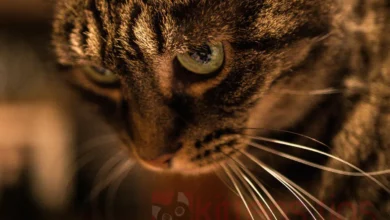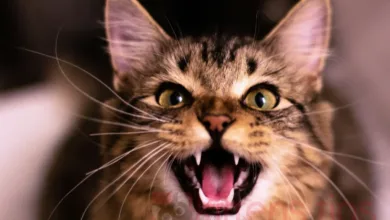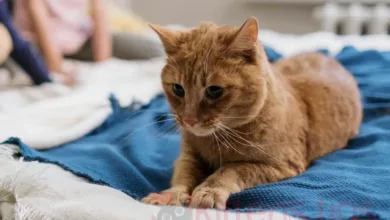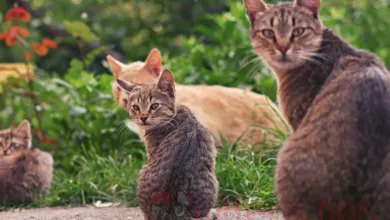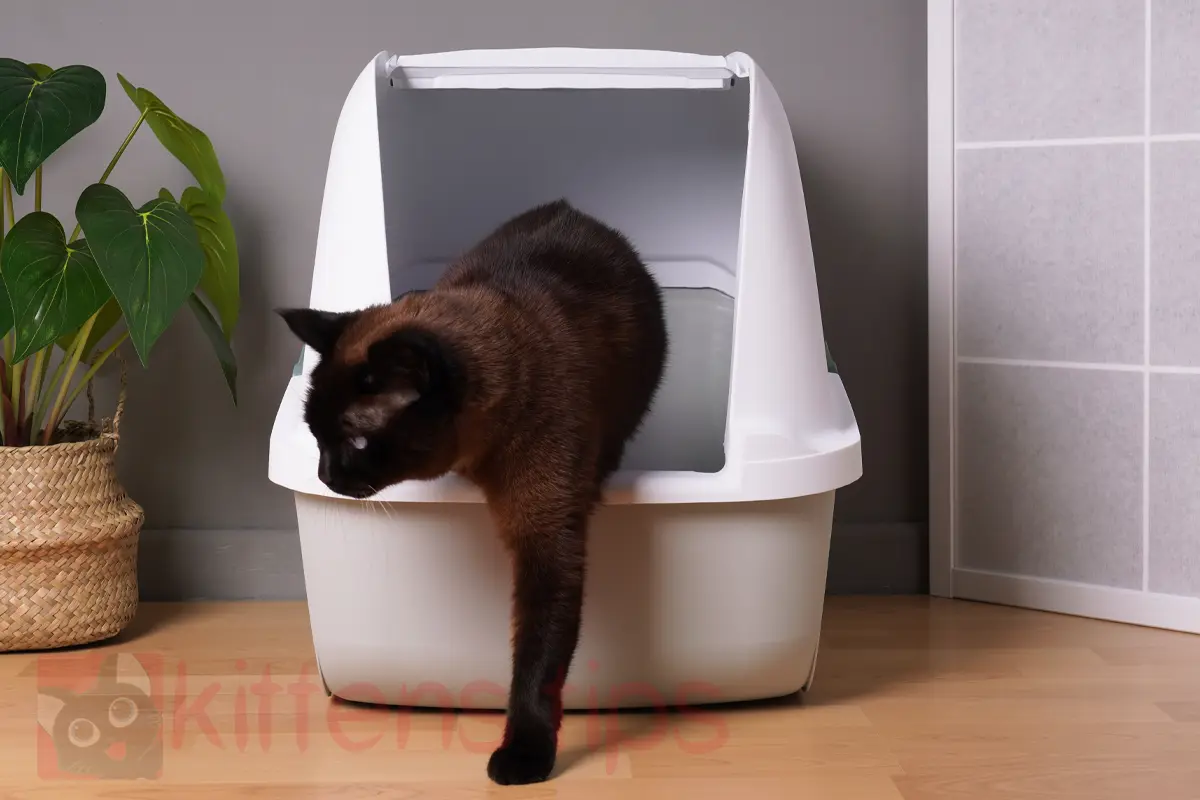
Cat Urinating Outside the Litter Box? How to Solve This Issue.
If your cat urinating outside the litter box, it’s a sign that something is amiss. Having a cat in the house, it’s certainly not a pleasant situation when your cat chooses to pee on the bed, the doormat, or other places around the house. Most of the time, a cat avoids the litter box either due to behavioral issues or underlying medical problems.
Let’s explore where this behavior of a cat covering its waste in the litter box originates.
Table of Contents
How Do Cats Know to Use the Litter Box?
Normally, regardless of size, once shown the litter box, a cat will instinctively go there for its physiological needs, both defecation and urination.
Cats have a natural behavior of covering their feces and urine to protect themselves from potential predators. This behavior is rooted in their survival instincts. By covering their excrement, potential predators won’t identify the smell, thus keeping them safe. Therefore, cats exhibit this behavior not for hygiene reasons but for survival.
However, cats also place a high value on cleanliness. If your cat is urinating outside the litter box, it’s essential to check if the litter box is clean.
The Litter Box Can Be a Reason Your Cat Is Urinating Outside
If your cat doesn’t feel comfortable in the litter box or finds it challenging to use, several common issues can make the cat seek alternative places for its physiological needs:
If your cat doesn’t feel comfortable in the litter box or finds it challenging to use, several common issues can make the cat seek alternative places for its physiological needs:
- Insufficient Cleaning of the Litter Box: If the litter box smells of feces and urine, the cat may refuse to use it. This is especially true for covered litter boxes that trap odors inside.
- Too Little or Too Much Litter: Cats often prefer a 5-6 cm layer of litter in the box, enough to cover urine and feces.
- The Litter Box Is Too Small: If the litter box is too small for the cat, it might be tempted to find other places in the house for its physiological needs. Cats need enough space to turn 360 degrees in the litter box and dig a hole to urinate.
- One Box for a Large House: In a larger house, at least two litter boxes are needed, especially in homes with multiple floors.
- Multiple Cats, Multiple Boxes: Ideally, each cat should have its litter box. While two cats can often share the same box without issues, some cats may be more particular and avoid sharing.
- Surface Preferences: Some cats develop preferences for specific surfaces, such as carpets, potting soil, or bed linens.
- Preferences or Aversions to Specific Types of Litter: Due to their sensitive senses, cats may dislike the smell or texture of certain types of litter, causing them to avoid boxes with those materials.
- Location Preferences: Like humans or dogs, cats can have preferences for where they do their business. Incorrectly placing the litter box can lead to avoidance.
- Inability to Use the Litter Box: Older cats or those with certain physical limitations may struggle with using certain types of litter boxes. Choosing an appropriate box for their needs is crucial.
- Negative Association with the Litter Box: Some cats may cease using a usual litter box due to associating it with a traumatic or painful event. For instance, if a cat experienced pain during urination in the past, it may avoid the litter box to prevent discomfort.
- Stress: Changes in a cat’s routine or environment, such as moving houses or introducing new family members or pets, can cause stress and anxiety, leading the cat to avoid the litter box.
- Conflicts in Multi-Cat Homes: In households with multiple cats, a hierarchy in litter box use can form, with a dominant cat causing stress and litter box issues for other cats.
Medical Causes for a Cat Urinating Outside the Litter Box
In addition to behavioral and environmental issues, there can be medical problems causing a cat to urinate outside the litter box.
Urinary Tract Infections (UTIs):
If a cat frequents the litter box but produces a very small amount of urine, it may be suffering from a urinary tract infection. In this case, consulting a veterinarian is recommended.
Painful Bladder Syndrome or Interstitial Cystitis:
This neurological condition affects a cat’s bladder. Cats with interstitial cystitis may attempt to urinate frequently but without success. This condition can lead a cat to urinate outside the litter box due to the urgent need to urinate or associated pain. As it is a serious, life-threatening condition, it is crucial to seek appropriate treatment.
Renal Blockages:
If a cat develops kidney stones or other types of blockages, it will attempt to urinate frequently but without success. Such cases are extremely painful, so it is imperative to consult a veterinarian immediately in this situation.
What to Do If Your Cat is Urinating Outside the Litter Box
When cats start urinating outside the litter box, there are several measures you can take to correct this behavior. The fundamental rule is to ensure that the cat feels comfortable in its litter box.
Keep the Litter Box Clean: Cats prefer clean litter boxes, so make sure to clean it at least once a day. Change the litter entirely once a week and sanitize the box.
Opt for a Spacious Litter Box: Most cats appreciate larger litter boxes that provide enough space for their needs.
Adjust the Sand Level: Ensure that the sand layer thickness is about 5-6 cm, as this is a common preference for cats.
Avoid Scented Litters: Most cats prefer unscented litters, so avoid those with strong fragrances.
Don’t Change the Litter Too Often: If possible, try not to change the litter too frequently, as some cats prefer to smell their own traces in the box.
Provide a Secluded but Accessible Location: Find a quiet but easily accessible location for the litter box so that the cat feels safe using it.
Ensure You Have Enough Litter Boxes: If you have multiple cats, ensure there are enough litter boxes for each one.
Avoid Placing the Food Bowl Near the Litter Box: Cats prefer separate areas for eating and eliminating.
Clean Up All “Accidents”: Carefully remove any traces of urine or feces from outside the litter box to prevent lingering odors.
Reduce the Attractiveness of Undesired Surfaces: If the cat develops a preference for certain surfaces, you can use rugs or aluminum foil or spray with citrus essential oil to make those surfaces less appealing.
Create Positive Associations with the Litter Box: If the cat has developed negative associations with the litter box, try offering pleasant experiences around it, such as moving the location of the litter box, playing nearby, or providing toys and rewards.
Territory Marking with Urine
Territory marking with urine is a problem, especially common in male cats. This behavior is unrelated to the issues mentioned earlier and is more about an instinctual defense of their territory.
Cats mark their territory by urinating, an action rooted in communication rather than issues directly related to litter boxes.
As cats grow and mature, they tend to explore and “claim” certain territories when given the chance. Even if a male cat can share territory with another, they communicate through different signals, and marking territory through urination is one of these signals. By doing this, a cat announces its presence in the territory and marks specific objects as its own.
Even though indoor cats may not need to find food or fight for survival, they can retain this mode of communication. However, the chances of them urinating outside the litter box are low if their environment is stable, free of conflicts, they are spayed or neutered, and do not need a mate.
If a cat is not spayed, desires a partner, or has been disturbed in some way, it may mark its territory with urine. This behavior helps keep unwanted individuals away and creates an atmosphere of familiarity and security for the cat.
This “territory marking language” includes the following features:
- Urine is usually sprayed on vertical surfaces.
- The cat leans against a vertical object (such as a chair, wall, or sofa), standing with its body elevated and tail straight up in the air.
- The amount of urine released is much smaller than in regular urination in the litter box.
- The urine has a specific and very strong smell.
There are also certain characteristics of the cat or its environment that can contribute to urine marking:
- The cat is an unneutered male, although this action can be performed by females or neutered males; it is more common in those that are unneutered, as it is a way to find a partner.
- The presence of multiple cats in the same household increases the chances of territorial marking issues.
- There are conflicts between cats in the household, which can lead to urine marking.
In conclusion, if you notice that your cat is urinating outside the litter box, it’s important to understand that this could result from various factors. In many cases, the issue can be resolved with patience and attention. The crucial first step is to rule out any underlying medical causes, such as urinary tract infections or other conditions. Once medical aspects are addressed, you can implement strategies to make the cat comfortable in its litter box, including maintaining cleanliness, ensuring accessibility, and using the right litter. Moreover, understanding behavioral reasons, such as territory marking, can contribute to preventing urination outside the litter box.
With patience, attention, and appropriate adjustments, it’s possible to return to a harmonious and clean environment in your home, with your cat using the litter box as intended.
If your cat is exhibiting this behavior, it’s crucial to identify and address the root cause promptly. Observing your cat’s preferences and maintaining a clean and suitable litter box environment can often resolve these issues. If problems persist, consulting with a veterinarian is recommended to rule out any underlying medical concerns.
